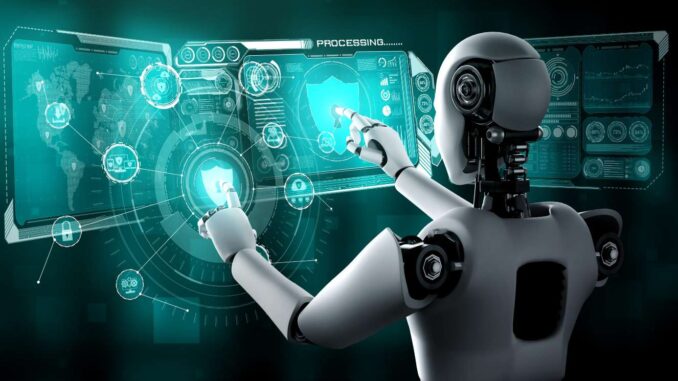
AI systems have found applications across numerous sectors and industries, significantly impacting how businesses operate and how services are delivered. Here are some notable applications of AI in the real world:
### 1. **Healthcare** – **Diagnostic Tools**: AI algorithms analyze medical images (e.g., X-rays, MRIs) to assist radiologists in diagnosing conditions such as cancer or fractures.










– **Predictive Analytics**: AI systems can predict patient outcomes and potential complications by analyzing patient data, helping in early intervention.
– **Personalized Medicine**: AI is used to tailor treatments based on individual patient genetics and history, improving efficacy.
### 2. **Finance**
– **Fraud Detection**: Machine learning models analyze transaction patterns to identify and flag potentially fraudulent activities in real-time.
– **Algorithmic Trading**: AI systems analyze market data and execute trades at optimal times, traditionally faster and often more accurately than human traders.
– **Risk Assessment**: AI tools evaluate creditworthiness and assess risk for loans by analyzing various data points beyond traditional metrics.
### 3. **Retail**
– **Recommendation Systems**: Retailers use AI to personalize shopping experiences by suggesting products based on past purchases and browsing behaviors.
– **Inventory Management**: AI helps optimize inventory levels by predicting demand and automating restocking processes.
– **Customer Service Chatbots**: Many retailers employ AI-powered chatbots to assist customers in real time, providing support and answering inquiries.
### 4. **Transportation**
– **Autonomous Vehicles**: AI plays a crucial role in self-driving technology, enabling vehicles to perceive their environment, make decisions, and navigate safely.
– **Traffic Management**: AI systems analyze traffic patterns in real time to optimize signal timings and improve traffic flow.
– **Route Optimization**: Logistics companies use AI to calculate the most efficient delivery routes, saving time and reducing fuel costs.
### 5. **Manufacturing**
– **Predictive Maintenance**: AI analyzes machine data to predict malfunctions before they occur, reducing downtime and maintenance costs.
– **Quality Control**: Machine vision systems inspect products on production lines for defects, ensuring higher quality and consistency.
– **Supply Chain Optimization**: AI helps optimize the supply chain by forecasting demand, managing inventory, and improving supplier relationships.
### 6. **Marketing and Advertising**
– **Targeted Advertising**: AI analyzes consumer behavior and preferences to create personalized marketing campaigns and ads.
– **Customer Insights**: AI systems provide businesses with insights into customer sentiment and trends through social media and online feedback.
– **Content Generation**: Some platforms use AI to generate marketing content, such as social media posts or ad copy, rapidly and efficiently.
### 7. **Education**
– **Personalized Learning**: AI can adapt educational content and delivery to meet the needs of individual students, enhancing the learning experience.
– **Assessment Tools**: Automated grading systems evaluate student work, providing instant feedback and saving educators time.
– **Tutoring Systems**: AI-driven tutoring programs can offer extra help on specific subjects based on students’ learning styles and progress.
### 8. **Agriculture**
– **Precision Farming**: AI technologies analyze soil data, weather patterns, and crop health to optimize planting and harvesting schedules.
– **Automated Machinery**: AI powers autonomous tractors and drones for planting, monitoring crop health, and applying fertilizers or pesticides.
– **Yield Prediction**: Machine learning models forecast crop yields based on various input factors, assisting farmers in planning and resource allocation.
### 9. **Energy Sector**
– **Smart Grids**: AI optimizes energy distribution and consumption patterns, improving the efficiency and stability of power grids.
– **Energy Management Systems**: AI tools analyze energy usage patterns in buildings, helping reduce energy consumption and costs.
– **Predictive Maintenance for Equipment**: Similar to manufacturing, AI is used for maintaining equipment in energy production and distribution to prevent failures.
### 10. **Entertainment**
– **Content Recommendation**: Streaming services like Netflix and Spotify use AI to recommend movies, shows, and songs based on user preferences.
– **Game Development**: AI is used to create more realistic and responsive game environments, NPC behavior, and personalized gaming experiences.
– **Content Creation**: AI-generated music, art, and even writing are becoming increasingly popular, producing novel content across various media.
The integration of AI into these various domains enhances efficiency, improves decision-making, and often provides services that significantly improve user experience. As AI technology continues to evolve, its applications in the real world will likely expand even further, creating new opportunities and challenges across industries.

Leave a Reply